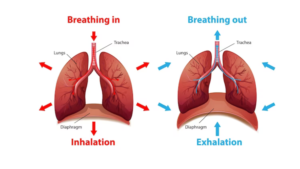Several factors can cause shortness of breath symptoms, including anxiety. It’s important to understand the relationship between the two and recognize that they are things that can cause anxiety. Recognizing the signs can help people get the help and treatment they need. The aim of this article is to elaborate on how anxiety is related to breathing problems.
What is segmental shortness of breath?
Another name for shortness of breath is the feeling of not being able to breathe or having difficulty breathing. It can range from mild to severe and cause other symptoms such as shortness of breath or chest tightness.
Understand the concern:
Anxiety is a complex mental illness characterized by feelings of fear, anxiety and uneasiness. It comes in a variety of forms, including social anxiety, panic disorder, and generalized anxiety disorder (GAD).
These physical symptoms perpetuate a vicious cycle of worsening anxiety.
The relationship between anxiety and relaxation:
Anxiety-induced shortness of breath can result from the body’s stress response. The body’s “fight or flight” response is triggered when it perceives a threat or danger. This response releases stress hormones, leading to increased heart rate, shallow breathing, and muscle tension.
People with anxiety can experience shortness of breath due to their stress response.
Vital signs to be aware of asphyxia:
Recurrent cases of shortness of breath:
Anxiety-induced shortness of breath often accompanies a relapsing condition. Specific triggers such as social situations, crowded environments, or stressful events can trigger these issues. The distinction between anxiety-induced relaxation and other manifestations, such as medical manifestations, can be facilitated by recognizing this characteristic

Absence of physical stimuli:
Unlike dyspnea caused by physiological factors such as exercise or constipation, anxiety-induced dyspnea can occur despite physical stimuli or physical exertion it is obvious
Ventilate while relaxing :
People suffering from anxiety may have shortness of breath even when they are not exercising or doing something strenuous. This is because the shortness of breath associated with anxiety is more closely related to the person’s mental state than exercise
Breathing problems during panic attacks:
Shortness of breath is one of the physical symptoms that can accompany panic attacks or extreme anxiety. People may suddenly experience severe shortness of breath as a primary symptom of panic. It is important to understand that anxiety is the main cause of jumps and panic attacks.
Seeking expert help:
If you’re having trouble breathing and think anxiety could be to blame, it’s important to get specialized care. Consultation with physicians and psychiatrists can lead to an accurate diagnosis and appropriate treatment.
Behavioral modification and possible treatments
Recreational Activities :
Relaxation exercises are a helpful way to deal with anxiety-induced shortness of breath. Using techniques such as deep guided breathing or diaphragmatic breathing, people can regain control of their breathing and reduce symptoms of physical anxiety If this exercise is done regularly, it can help them feel relaxed and comfortable.
CBT, commonly called cognitive behavioral therapy:
Cognitive Behavioral Therapy (CBT) is a common treatment modality that is effective in treating anxiety and its symptoms. It focuses on understanding and changing the unhealthy thoughts and behaviors that lead to ulcerative anxiety. CBT can help people manage anxiety and reduce the frequency and severity of shortness of breath by addressing these underlying causes
Conclusion
Understanding the root cause of this symptom is critical to treating anxiety-induced shortness of breath. Understanding the relationship between anxiety and shortness of breath can help people get the help and treatment they need from doctors. There are many ways to successfully treat anxiety-induced shortness of breath, including relaxation exercises, therapy, medication, and lifestyle changes Keep in mind as a first step the way to find relief and improve the common good is to ask for appropriate help.
Frequently asked questions
Can anxiety make your breathing difficult?
Yes, anxiety can be a source of relief. Shortness of breath can be caused by physiological changes in the body’s response to anxiety, including shallow breathing and tense muscles
How can I tell the difference between bad breath that causes anxiety and one that is medical?
The ability to distinguish shortness of breath from anxiety-related medical issues may warrant appropriate medical advice. They can analyze your symptoms, your medical history, and perform the necessary tests to fully diagnose the cause.
Will relaxation techniques completely fix respiratory problems?
Anxiety-induced shortness of breath can be managed and reduced with the help of relaxation techniques such as deep breathing exercises. However, it is important to keep in mind that everyone’s experience is unique and can benefit from different approaches including therapy.
Are anti-stress medications necessary?
Medications may be recommended to treat anxiety and reduce its respiratory symptoms. A qualified healthcare practitioner should be consulted before using any product, taking into account specific circumstances and factors
Can lifestyle changes alone help manage anxiety symptoms?
A comprehensive approach that may include therapy and medication is often the most effective in treating anxiety-induced dyspnea. Although lifestyle changes such as stress management strategies, regular exercise, and a healthy diet can go a long way in managing anxiety-related symptoms.